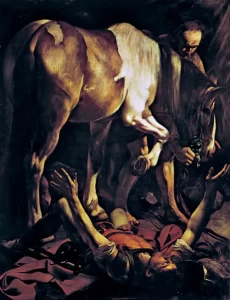Words on the Word
Conversion of St Paul
Acts 22.3-16: I am Jesus, whom you are persecuting.
Mark 16.15-18: Go out and proclaim the Gospel to all creation.
Today we commemorate a conversion. Who was the unconverted Paul? He was a zealous man, learned in his faith, pugnacious in action. The Paul we first encounter (when he was still called Saul) at the stoning of Stephen or galloping towards Damascus, is no hesitant seeker in a spiritual crisis. No, he is sure of being on the right path, bound in the right direction. Conversion is, as far as he is concerned, a matter for others.
Then he falls off his high horse.
Paul’s conversion is an important event in the New Testament – the event is described four times. It has been celebrated liturgically for about as long as we have celebrated Christmas. The example it gives is timeless. In addition, each generation has contemplated it on the basis of its own circumstances and challenges. That is what we, too, must do.
The conversion of Paul very much speaks to us, who live in a time of extreme subjectivity. Everyone claims his or her right to define their own reality, their own truth. A former US president has devised a medium through which a statement is published as a ‘truth’ by the mere fact of being made. With increasing frequency we hear the word ‘truth’ used with a first-person singular possessive pronoun: even university presidents can be found to speak in earnest about ‘my truth’.
In a way it is agreeable to behold the world in this light. If truth is mine, it follows that I am always right. That is most pleasing. At least as long as I don’t bump into others equally bound to their truth, in conflict with mine. That, I suppose, is why we withdraw from society and seek security in quiet corners where we speak to ourselves or to a handful of chosen companion whose ‘truth’ affirms our own.
The young Paul gives us an example of one who thinks he has the truth sorted out, that he keeps it in the hollow of his hand. He would shape the world by it. People who stand for something else he would eliminate, even execute, should it come to that. He storms ahead at peace with his conscience. Then he is converted. That is, he is cast down. He must bite the dust and concretely confront the real, re-evaluating all his abstract convictions. He who had considered himself so clearsighted becomes blind. He neither eats nor drinks.
For three days, a period of time corresponding to a Paschal triduum, Paul subsists in this state. Something in him dies. Something else, something glorious is resurrected. The experience underpins all he wrote and did thereafter. Much could be said about it. I’d like to point towards this one fact: By God’s power Paul recognises that the truth by definition is greater than what an individual can fathom. He learns to be humble before it. In addition he ascertains that he needs the Church in order to believe. He realises that the Church is more than an assembly of believers, that it constitutes a personal mystery. ‘Why are you persecuting me?’ Jesus asks him, the persecutor of the Church. Ananias tells him in Jesus’s name: ‘Regain your sight’. And Paul does.
He sees that to serve the one true God is to know Jesus Christ, the Son of God; that to know Christ is to live as a member of his Body, the Church; that we are incorporated into the Church by pouring ourselves out in her and for her, united to Christ’s sacrifice. For the risen Lord Paul meets on the road to Damascus, who through the Church lets him receive the fullness of the Spirit, is the Lamb of God who takes away the sins of the world. His motto was to be: ‘We proclaim Christ crucified!’ (1 Cor 1.23).
That is what Paul would do for as long as he lived, ever more devotedly and worshipfully, admiring a Truth that reveals itself ever more wonderfully until as a matter of course, at Aquae Salviae, he gave his life in the name of Jesus. ‘For if we live’, he confessed, ‘we live unto the Lord, and if we die, we die unto the Lord; whether we live or die, we are the Lord’s’ (Rm 14.8). He is the Truth that liberates and sanctifies, holding all.
Here, then, are the terms on which we also are called to live and die, having been ‘destined and appointed to live for the praise of his glory’ (Eph 1.12). Amen.

Has anyone ever captured the sheer drama of this scene more penetratingly than Caravaggio? From a painting in the Cerasi Chapel of the basilica of Santa Maria del Popolo, Rome.
